Learning Objectives
At the end of this presentation the learner will:
- Learn more about ethical problems inherent in health care;
- Identify the key components of ethical theories;
- Find out how complex ethical issues can be mitigated;
- Be able to reflect on their approach to the ethical issue.
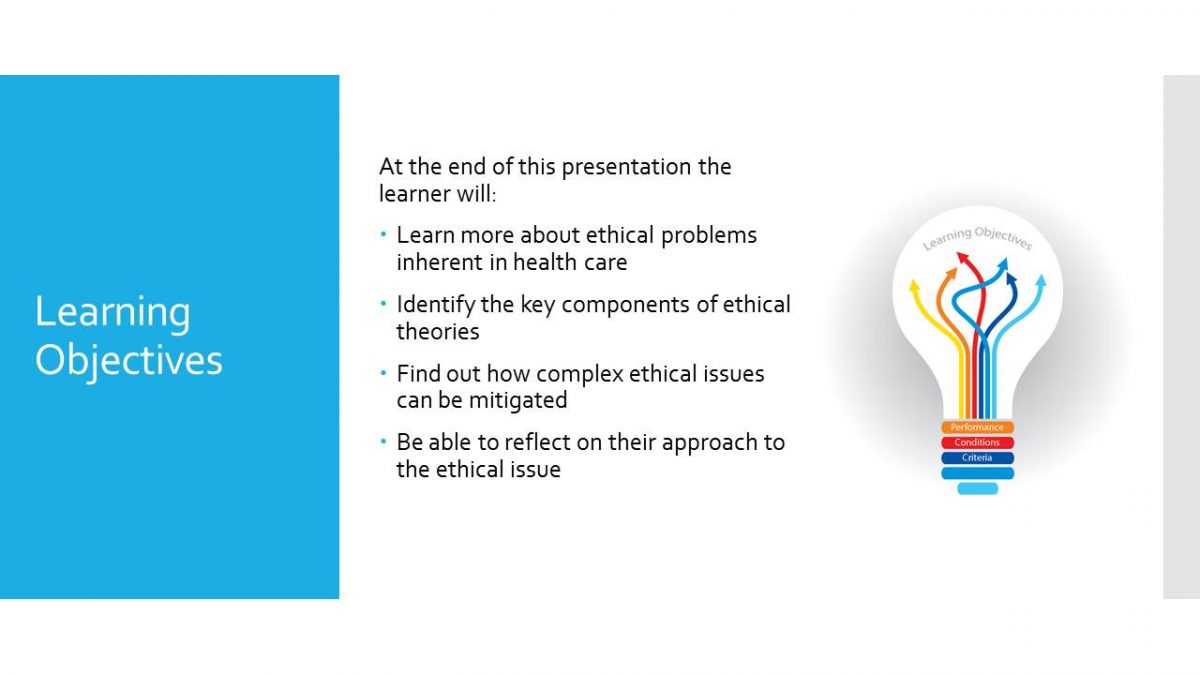
Introduction
- Being a nurse is a rather complex task in terms of a variety of social, political, and medical implications (Hamric, Hanson, Tracy, & O’Grady, 2013).
- The rationale behind this presentation is the analysis of a case that involved an ethical dilemma.
Today, being a nurse is associated with a number of complexities due to the need to comply with diverse obligations in social, political, and healthcare segments (Hamric, Hanson, Tracy, & O’Grady, 2013). It remains apparent that concepts such as fidelity are the core definers of nurses’ actions and behavior, as a nurse plays a role of a mediator between the management of the hospital, healthcare system, patients, and their relatives (Hamric et al., 2013).
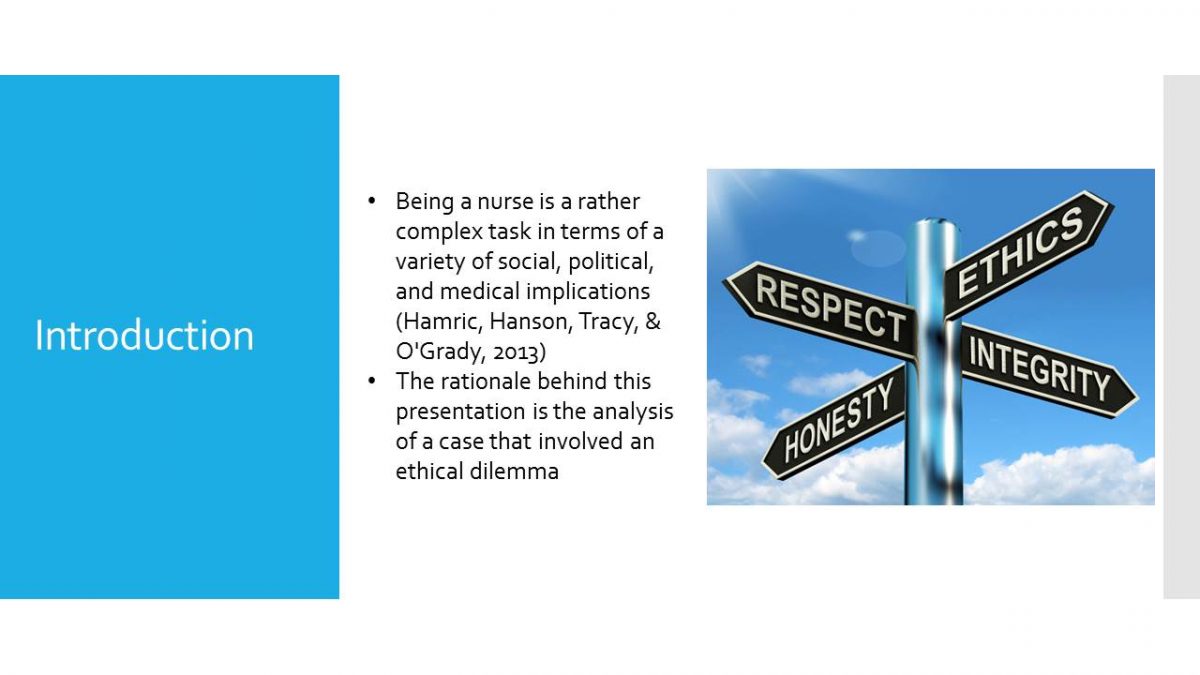
Clinical Ethical Situation
- The patient had cancer with low chance of being cured;
- She (the patient) stopped taking any medications and refused any of the procedures that were vital for her survival (such as insertion of urinary catheter).
Ethical dilemmas in nursing are rather common. Thus, one of the cases incurred at my workplace in the recent past. The situation took place at the hospital, where one of the patients was transferred due to some health problems. Thus, after organizing a series of tests, it was revealed that a patient had a type of cancer with a low chance of being cured. The thirty-year-old woman (the patient) was informed about her condition by her family doctor after being released home from the hospital. Thus, it could be said that she lost hope as her condition continued to worsen; she stopped taking prescribed medication and accepting the required treatment. Procedures such as insertion of urinary catheter were essential for the maintenance of her organs and survival, but she continued to refuse them.
- The patient’s relatives convinced her to stay at the hospital;
- The doctors discovered that the patient was terminally ill but reached an agreement with her relatives and did not let the patient know that she was terminally ill;
- The patient died without knowing that she was terminally ill while the nurses had to lie to her.
Apart from the patient’s confrontation, her relatives were able to convince her to stay at the hospital since there was a small chance of being cured. Meanwhile, the doctors discovered that she was terminally ill and informed her family about this condition. Relatives, in collaboration with the medical personnel of the hospital, agreed not to inform the patient about her state, as they believed that it would help her regain hope. To support this scenario, family members started planning vacations after her release from the hospital. Unfortunately, the outcome of this situation was rather negative, as the patient died without knowing about her actual medical condition. Overall, the described situation involved relatives, medical professionals, and the patient as the main actors. It could be said that catering the needs of the family created ethical dilemmas for nurses, as they had to lie and be dishonest to the patient. This type of problem often takes place, but it is still unclear whether physicians should disclose the diagnosis to the terminally ill patients or not since it has its both advantages and disadvantages.
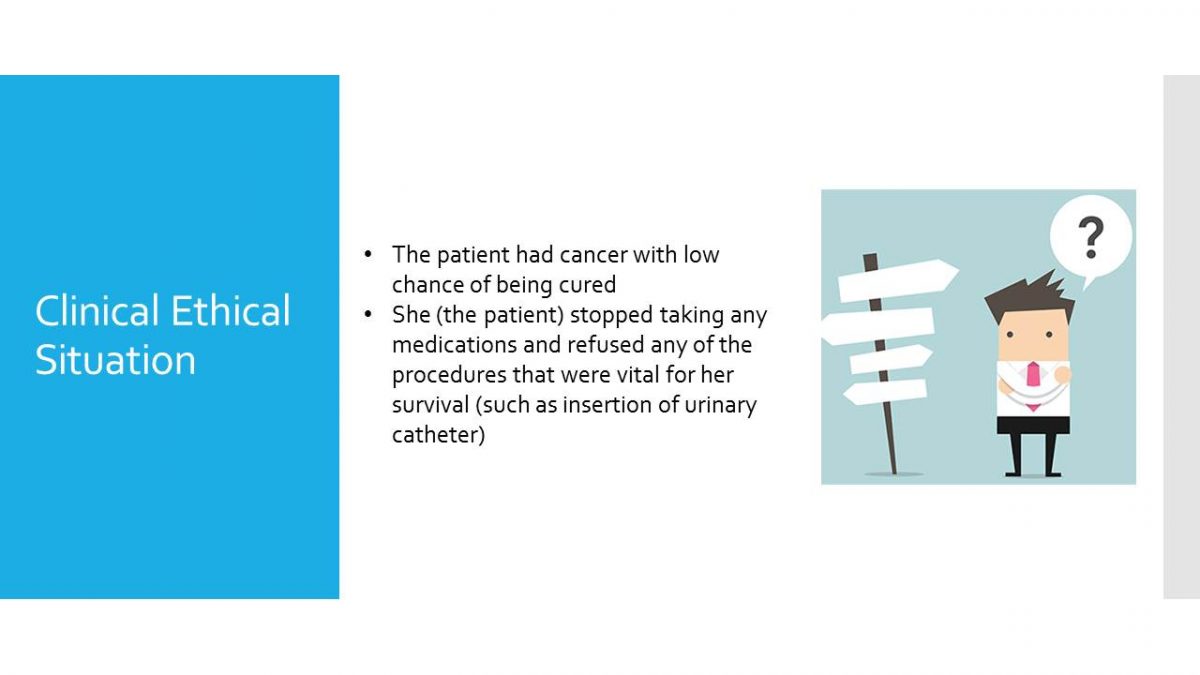
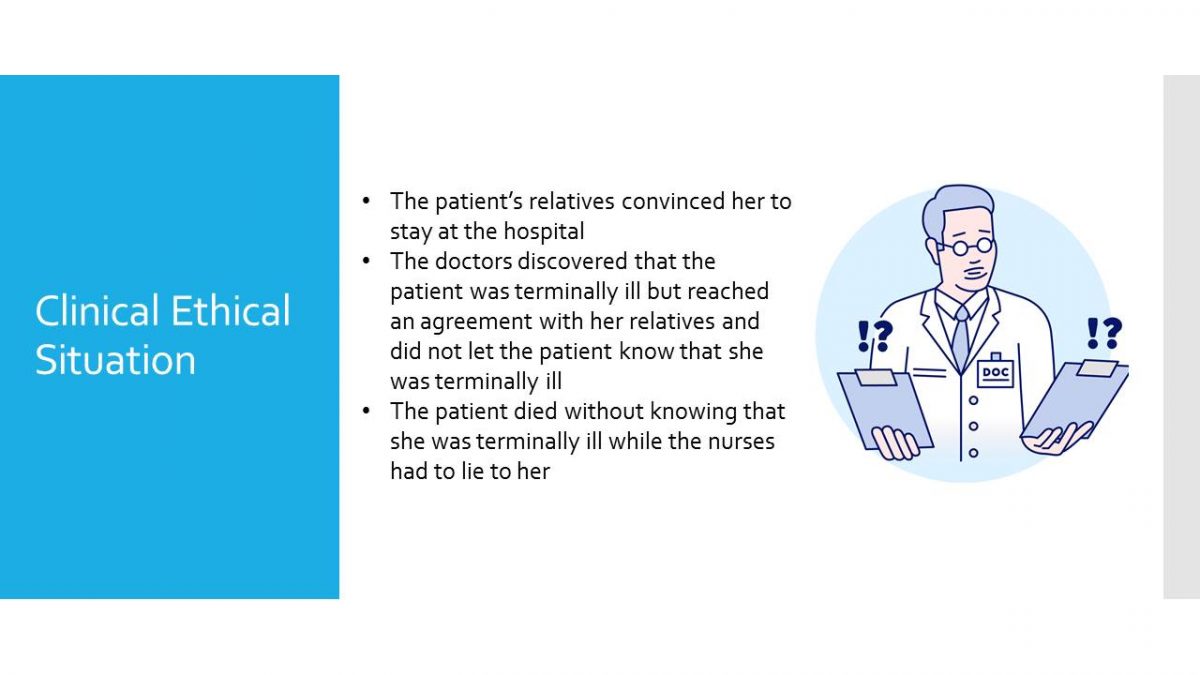
Ethical Dilemma Characteristics
- Communication issues (Luz et al., 2015);
- Concealing the truth (Safaris, Tsounis, Malliarou, & Lahana, 2014);
- Multiple commitments dilemma.
The situation described above can be viewed as one of the examples of communication problems. It could be discovered as the most common issues, for example, in oncology, along with other matters that nurses have to pay substantial attention to (Luz et al., 2015). Not being able to consider clarity of communication of paramount importance will trigger the development of insecurity and destroy the well-developed bond between patients and medical professionals (Luz et al., 2015).
Nonetheless, miscommunication is not always the case. For example, sometimes nurses and physicians chose to conceal the truth from terminally ill patients (Safaris, Tsounis, Malliarou, & Lahana, 2014). In the context of the presented case study, the medical personnel did it since they wanted not only to help the patient to regain hope for being cured but also cater the needs and desires of her family.
At the same time, it is possible to identify that the situation has some characteristics of multiple commitments dilemma. The assessment of the case shows that communication issue highly interferes with the need to satisfy the needs of several parties including other nurses, physicians, relatives, and patients (Hamric et al., 2013).
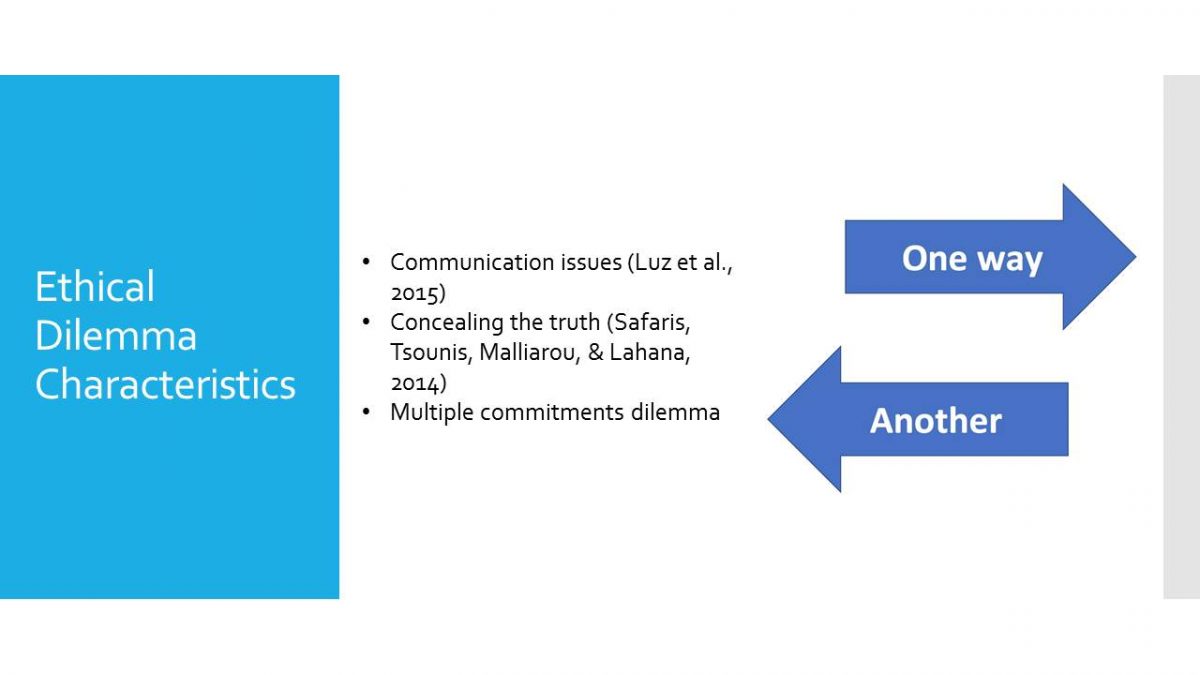
Ethical Principle(s) Violated
- Ignoring patient’s autonomy;
- Ignoring the rule of veracity (Hamric et al., 2013);
- Ignoring the rules of confidentiality and privacy.
Due to the common occurrence of ethical dilemmas, it is easy to depict the core matters that were violated. In the first place, one of them is ignoring patient’s autonomy, as any nurse is obliged to respect everyone’s freedoms and liberties (Hamric et al., 2013). In this case, the patient had a right to decide whether to continue receiving treatment or not, as only in this instance, her rights and freedoms would be respected.
At the same time, it is evident that apart from a distinct violation of patient’s autonomy, the rule of veracity was also disrespected. This concept implies that a nurse should tell the truth to a patient and provide only relevant information about his/her medical condition (Hamric et al., 2013).
In turn, the presented situation is more complicated than it seems, as the actions of the medical personnel also did not comply with the rules of confidentiality and privacy. These aspects are the defining principles of the nursing profession, as nurses have to keep all confidential information in order, avoid its leakage, and do not transfer information to third parties (Hamric et al., 2013).
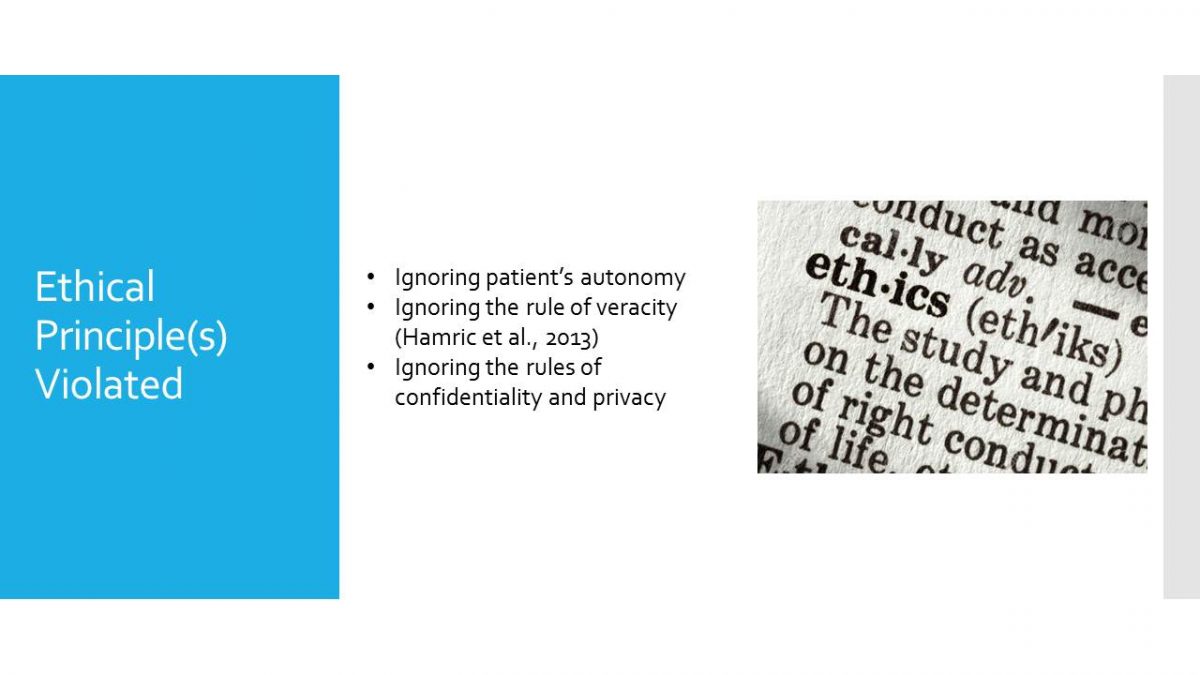
Barrier(s) to Ethical Practice
- There are numerous internal and external factors (such as patient-provider barriers) that can impact the decision-making process;
- Another barrier is the obligation to provide health care services in line with the patients’ needs (Butkus, 2014);
- Non-adherence within the patient-provider relationships is also a serious ethical barrier;
- The last barrier is inherent in interprofessional misunderstanding and inability to showcase ethical decision-making.
There are several matters that can be viewed as the barriers to ethical practice. For example, Hamric et al. (2013) state that there is a plethora of external and internal factors that may have a substantial impact on the selection and implementation of ethical theories and decision-making process. In the first place, it is crucial to consider patient-provider barriers, as these stakeholders may have entirely different perceptions concerning appropriate medical treatment and other beliefs (Hamric et al., 2013).
One of the clearest examples of patient-provider barriers is the need to cater patient’s and relatives’ wishes and desires while aligning the practice with the nursing principles (Butkus, 2014).
It could be stated that another barrier that is highly linked to the obstacles of the patient-provider relationship is non-adherence (Hamric et al., 2013). This concept implies that a patient may not have the desire to improve his/her wellbeing and psychological and physical condition.
Lastly, many theorists highlight various interprofessional barriers that tend to have a strong effect on ethical decision-making. The main idea of this concept pertains to the fact that different professionals such as nurses and physicians have dissimilar understandings of the same situation and interpret acceptable ethical behavior differently (Hamric et al., 2013).
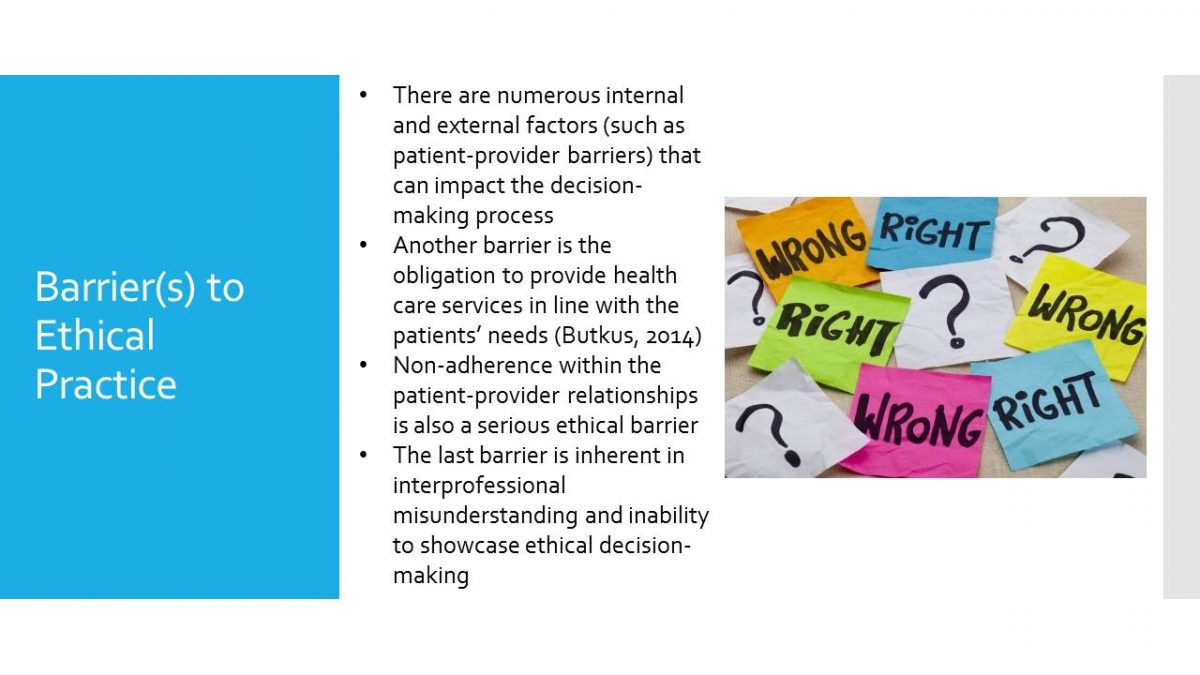
Ethical Theory
- Casuistry was found to be the most appropriate ethical theory because its followers have different outlooks regarding the act of lying (Butts, 2015);
- Lying should be seen as an opportunity to improve patient-provider relationships and a potential benefit to the health care practice;
- This ethical theory considers both practical and ethical sides of the question as it takes into account the exceptions that may transpire (Marcus & Mott, 2014).
The case shows that telling the truth to the patient may not always be good due to its potential ability to cause harm, and disregarding related controversies, deceiving a terminally ill patient may be viewed as an ethical action. To support the rationale behind this decision-making, it is reasonable to refer to casuistry, as its followers have different perceptions towards lying (Butts, 2015). This theory implies that deceiving patient may be discovered as a professional duty and obligation while being viewed as a potential benefit for both sides of patient-provider relationship (Butts, 2015). After that, the decision has to be thoroughly discussed with the representatives of different professions since it will help explain reasons for this solution, identify gaps in it, and minimize stress levels. Based on the steps provided above, casuistry theory is the most appropriate method, as it will help avoid bias by considering practical side of ethics and the existence of potential exceptions (Marcus & Mott, 2014).
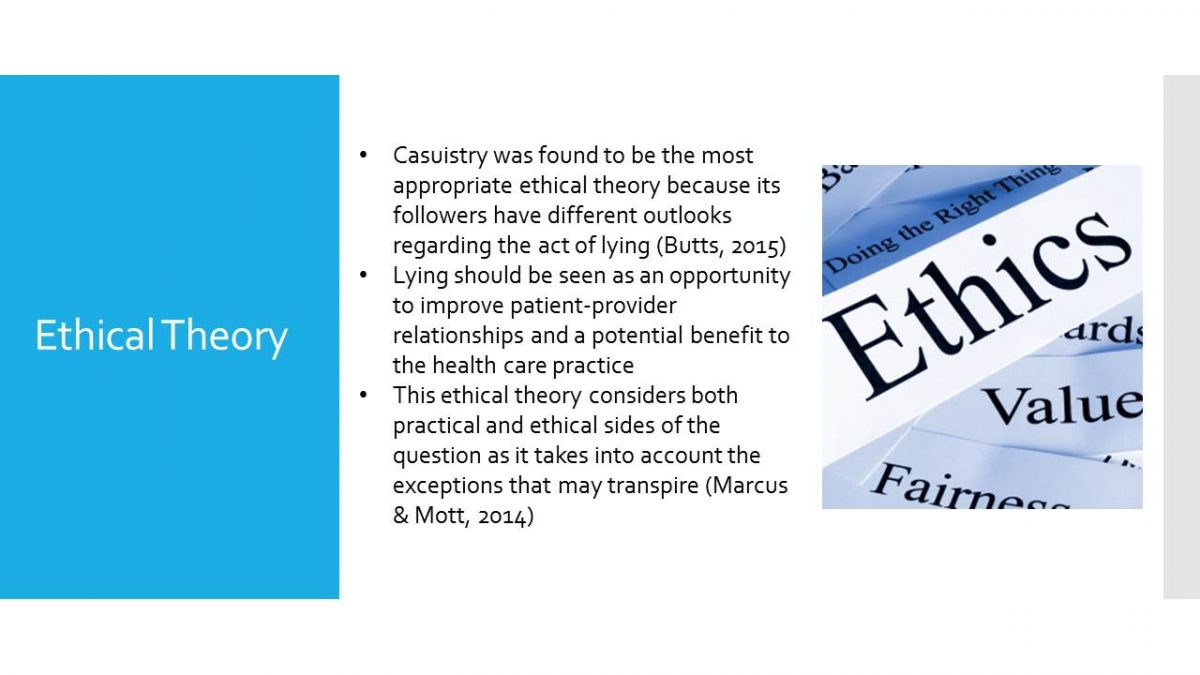
Self-Reflection
- The case was thoroughly reviewed;
- Ethical decisions were made on the basis of the existing information;
- Several ethical theories were evaluated so as to apply the gathered data in the most efficient manner;
- The learning objectives were achieved.
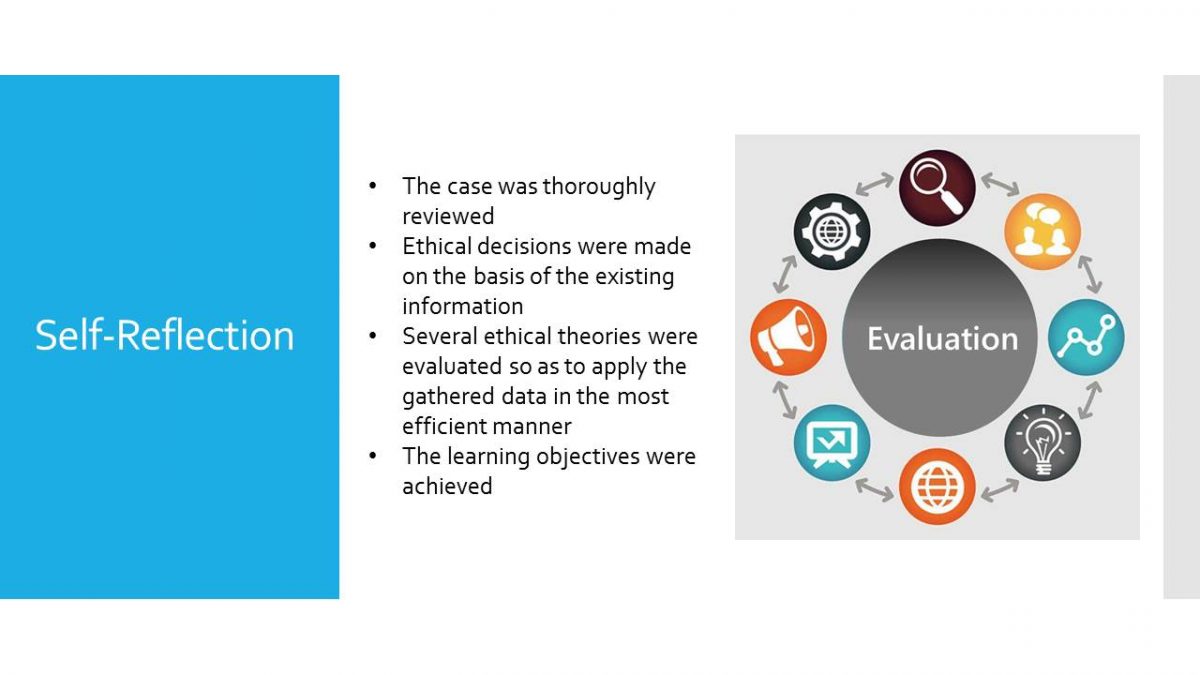
Conclusion
- Health care specialists are always under pressure and have to make ethical decisions at all times;
- Informing a terminally ill patient about their illness should not be an option;
- Strictly following the guidelines of nursing ethics is not always the answer;
- The more information the nurse can obtain, the more informed decision will be made regarding when and how to lie to a patient.
Overall, it could be said that the selected case is only one of the examples of ethical dilemmas faced by nurses in the modern world. Medical professionals have to constantly be under pressure and decide whether they should disclose the truth to the patients or conceal the important details of their diagnoses and medical conditions. In this scenario, nurses chose to take the side of the family and did not inform the patient about her terminally ill condition while the patient died in ignorance.
I can freely claim that this case assisted me in understanding that strictly following ethical guidelines might not always be appropriate. When facing a similar situation in future, I will employ the concepts of casuistry theory, as it states that every decision is highly dependent on the characteristics of the situation. Meanwhile, every case has to be discovered individually while referring to practical examples from the past. Collecting and evaluating the most important details of the case will help unveil whether deceiving patient is appropriate. Apart from the complexity of the decision-making process and the necessity to consider a plethora of factors, I will rely on this theory, as it will help design a logical solution while taking into account the preferences of different participants.
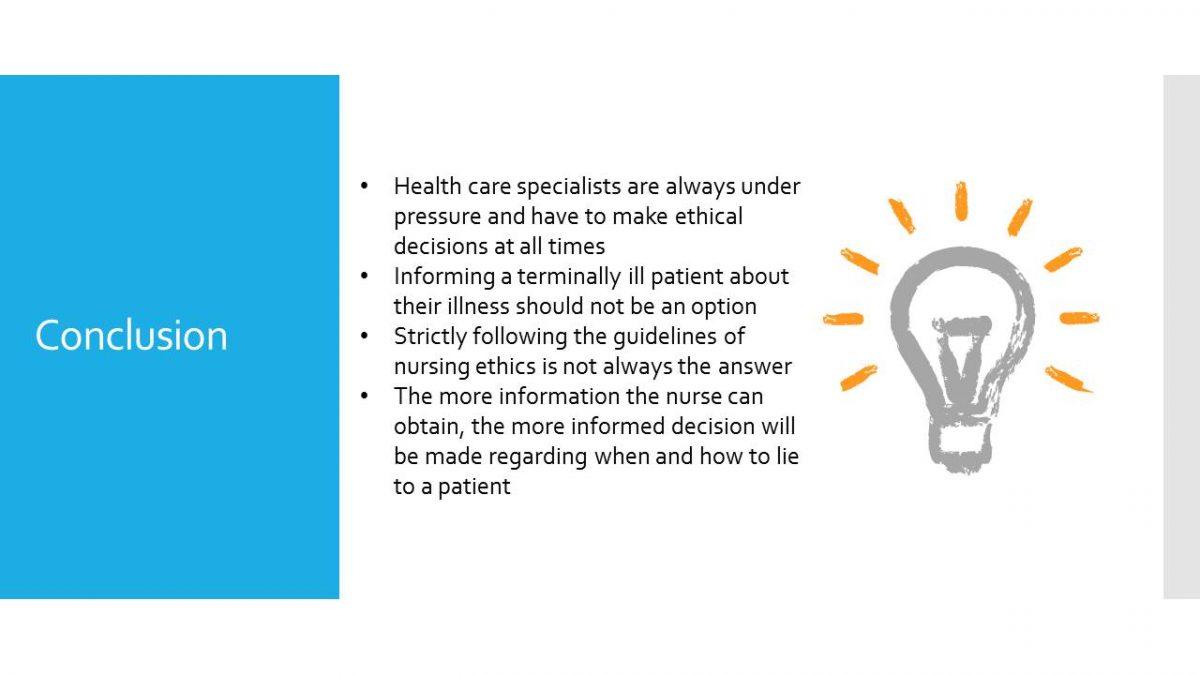
References
Butkus, M. (2014). Compassionate deception: Lying to dementia patients. Philosophical Practice: Journal of the American Philosophical Practitioners Association, 9(2), 1388-1396.
Butts, J. (2015). Nursing ethics: Across the curriculum and into practice. Burlington, MA: Jones & Bartlett Learning.
Hamric, A., Hanson, C., Tracy, M., & O’Grady, E. (2013). Advanced nursing practice: An integrative approach. St. Louis, MI: Elsevier Saunders.
Luz, K., Vargas, M., Schmidtt, P., Barlem, E., Tomaschewski-Barlem, J., & Rosa, L. (2015). Ethical problems experienced by oncology nurses. Revista Latino-Americana de Enfermagem, 23(6), 1187-1194.
Marcus, J., & Mott, F. (2014). Difficult conversations from diagnosis to death. The Ochsner Journal, 14(4), 712-717.
Safaris, P., Tsounis, A., Malliarou, M., & Lahana, E. (2014). Disclosing the truth: A dilemma between instilling hope and respecting patients’ autonomy in everyday clinical practice. Global Journal of Health Science, 6(2), 128-137.